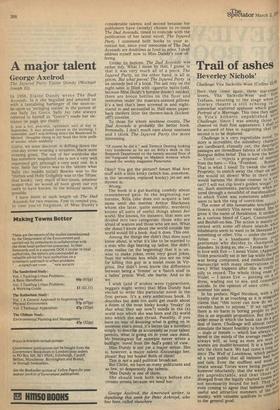A major talent
George Axelrod
The Injured Party Elaine Dundy (Michael Joseph E3) In 1958, Elaine Dundy wrote The Dud Avocado. In it she beguiled and amused us with a tantalising harbinger of the soon-tobe-upon-us 'swinging sixties' in the person of one Sally Jay Gorce. Sally Jay (she always referred to herself as "Gorce") made her entrance on page one thusly:
It was a hot, peaceful, optimistic sort of day in September. It was around eleven in the morning, I remember, and I was drifting down the Boulevard St Michel, thoughts rising in my head like little puffs of smoke, when suddenly . .
Gorce, we soon discover, is drifting down the mid-day street wearing a strapless, black satin evening gown. The rest of her wardrobe she has somehow misplaced; she is not a very well organised girl, although a very sexy one. In a way, Sally Jay Gorce was to the 'sixties what Sally (no middle initial) Bowles was to the 'thirties and Holly Golightly was to the 'fifties: that kooky, very much of-her-times, amateur sexpot that we would all have given our eye teeth to have known. In the biblical sense, if possible. I have dwelt at such length on The Dud Avocado for two reasons. First to remind you, in case you've forgotten, of Miss Dundy's considerable talents; and second because her publishers have (wisely) chosen to re-issue The Dud Avocado, timed to coincide with the publication of her latest novel. The Injured Party. I commend both books to your attention but, since your memories of The Dud Avocado are doubtless as fond as mine, I shall address myself now to Miss Dundy's new offering.
Unlike its herione, The Dud Avocado was rather tidy. What I mean by that, I guess, is that it was very much all of a piece. The Injured Party, on the other hand, is all in pieces. But what pieces! The Injured Party is an unmade bed of a book. The ash tray on the night-table is filled with cigarette butts (odd, because Miss Dundy's heroine doesn't smoke); there are booze bottles on the floor and memories under the mascara-stained pillows. It's a bed that's been screwed in and nightmared in and seconalled in. Half-eaten paperback thrillers litter the thrown-back (kickedoff?) coverlet.
To those for whom neatness counts, The Dud Avocado is probably the better book. Personally, I don't much care about neatness and I think The Injured Party the more interesting.
"Of course he did it," said Terence Deering looking very handsome as he sat on Rilla's desk in the Research Department on the twenty-second floor of the Vanguard building on Madison Avenue which housed the weekly magazine Panorama.
Okay? You got the picture? Smart Mad Ave stuff with a little kinky (which has, somehow, in the 'seventies, replaced kooky) jet-set sex thrown in.
Wrong.
The book is a gut-busting comedy about remembered pain. In the beginning our heroine, Rilla (she does not acquire a last name until she marries Arthur Blackman whom she later, quite sensibly, murders) knows all sorts of useful things about her world. She knows, for instance, that men are divided into two categories: those who are afraid of waiters and those who are not. What she doesn't know about the world outside her world would fill a book. And it does. This one.
Among the things she didn't (but does now) know about, is what it's like to be married to a man who digs beating up ladies. She didn't even realise (at the beginning) that it is unwise to make jokes, even very good jokes, from the witness box while you are on trial for killing this guy in a motel room in Virginia. She didn't even know the difference between being a 'femme' or a 'butch stud' in a ladies' prison. Well, she learns. And so do we.
I wish (and if wishes were typewriters, beggars might write) that Miss Dundy had
elected to write this particular novel in the first person. It's a very ambitious book. It describes but does not quite get inside about a dozen of the most kinky kooky 'freaky' (is that what they say now?) minds in the (a) world into which she was born and (b) world into which she was thrust. Possibly, if you have no way of knowing what is going on in someone else's mind, it's better (as a novelist)
simply to describe as accurately as your talent permits, what is going on in your own mind.
Mr Hemingway for example never wrote a bullfight novel from the bull's point of view.
Miss Dundy is not yet a major writer. She is, however, a major talent. Encourage her, please! Buy her books! Both of them!
This is not a paid political broadcast.
But Christ, we have so many politicians and so few, so desperately few talents.
Miss Dundy is one of them.
She should look both ways before she crosses streets because we need her.
George Axelrod, the American writer, is deputising this week for Peter Ackroyd, who has been called elsewhere
































 Previous page
Previous page